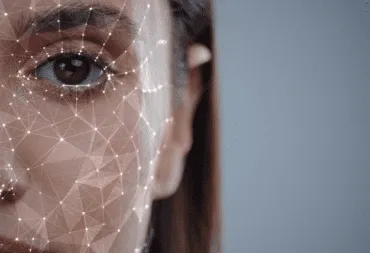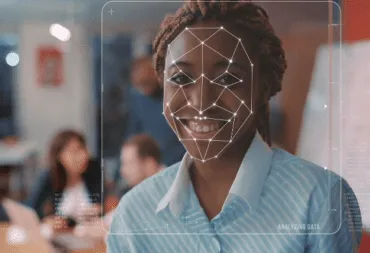Face recognition in healthcare: key use cases
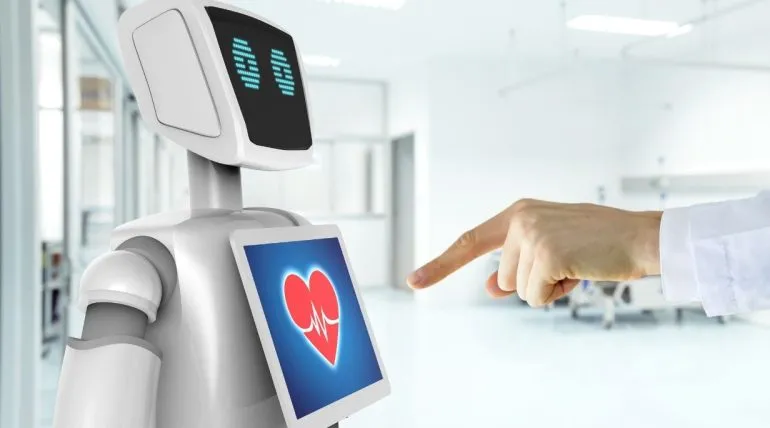
Computer vision has become a daily business and talk in healthcare, with face recognition as one of the most prominent technologies. It has been implemented to reduce the heavy burden on healthcare workers while transforming the lives of many patients and other community members.
Let’s take a look at how face recognition impacts healthcare:
How does face recognition work?
Face recognition is a technology that helps identify or verify an individual based on their specific facial features. It detects human faces in images, videos, or live feed, and matches them against a database of faces.
Face recognition technology developed here at Visage Technologies is based on face descriptors – unique arrays of numbers that describe faces. In other words, all biometric templates are mathematical representations of people’s faces. This way, biometric and personal information are strictly separated, ensuring the highest level of privacy, even when dealing with extremely sensitive data.
Face recognition software calculates the similarity between the input face descriptor and all face descriptors previously stored in a database. The goal is to find the face(s) from the database that is most similar to the input face. The higher the match, the more likely it is for the face to be accurately identified.
Face recognition is used to facilitate advanced video surveillance, access control, human-machine interactions, and more.
Video: visage|SDK FaceRecognition
Key use cases in healthcare
Face recognition is applied in diverse areas of healthcare to facilitate numerous operations. It can help automate operations, improve security, assist patients, provide better patient care, and much more.
– Facility security
Security is one of the most popular applications of face recognition technology. It’s a simple, automated way to scan anyone entering the facility. This way, any individual who should not be allowed to enter can be identified right away. For example, such individuals might include drug seekers, people who have previously been ejected from the hospital, and similar.
– Patient check in and check out
Check-in and check-out processes are fundamental in healthcare setup. Face recognition technology can make them easier and faster, decreasing the workload for hospital staff at the same time.
When a patient enters the facility, the face recognition system scans their face and runs it against the hospital database. The patient’s identity is verified in real time, without the need for paperwork or additional identification documents.
Besides simplifying the check-in and check-out process and improving the overall patient experience, face recognition also helps prevent fraud and misidentification of patients.
Face recognition has another significant advantage compared to other methods of identification. It doesn’t require any physical contact and can be used from a distance. This provides an additional layer of protection against infectious diseases, such as COVID-19.
– Employee time clock
Similarly to the patient check-in and check-out process, face recognition can also be used to clock the staff in and out.
Accurately identifying each individual employee helps keep track of their work hours. This makes it easier to prevent burnout in employees, eliminate time theft and buddy punching, better organize shifts, and more.
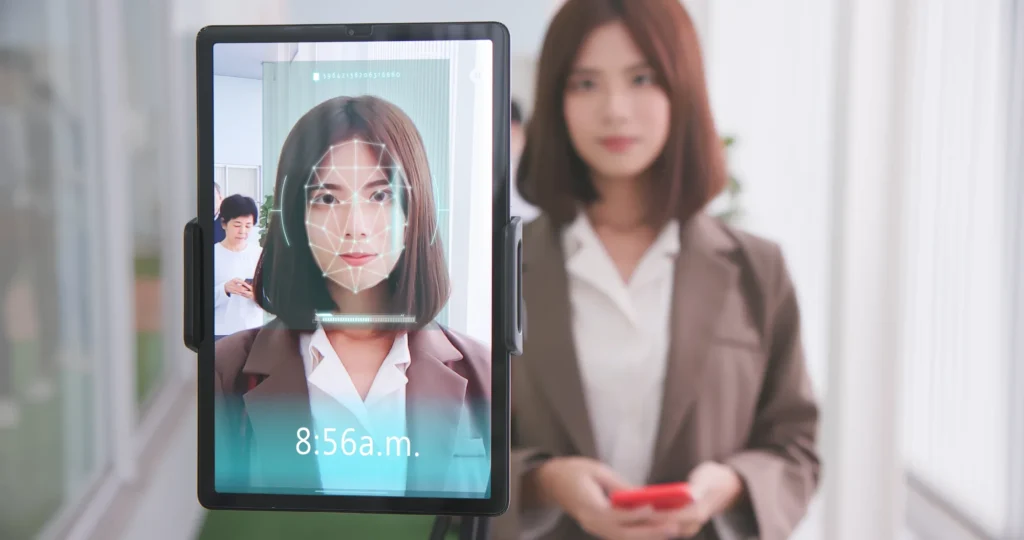
– Access control
Besides verifying someone’s identity, face recognition can also help control access to specific areas of the facility. For example, it can grant access to restricted areas to hospital staff or deny it to patients.
– Patient monitoring and diagnosis
Face recognition can be combined with complementary technologies such as real-time emotion recognition to get better patient insights. For example, it can be used to detect pain, monitor patients’ health status, or even identify symptoms of some illnesses.
The technology is non-invasive and contact-free, thus offering a substantial advantage for a wide range of patients. For example, children who might fear invasive procedures or healthcare setups can utilize this technology to monitor their health status.
– Caretaking robots
As more and more segments of caretaking become automated in response to healthcare worker shortages, robots are gradually making their way into healthcare. Equipped with advanced technologies – face recognition being one of them – they can better serve patients, both in hospitals and in patients’ homes.
Face recognition gives caretaking robots a way to improve interactions with patients. By “recognizing” a patient they have previously interacted with, it’s possible to make the interaction more personalized and engaging. For example, a robot that cares for the elderly can remind them to take their specific medicine, bring up their favorite topics when they seem sad, and more.
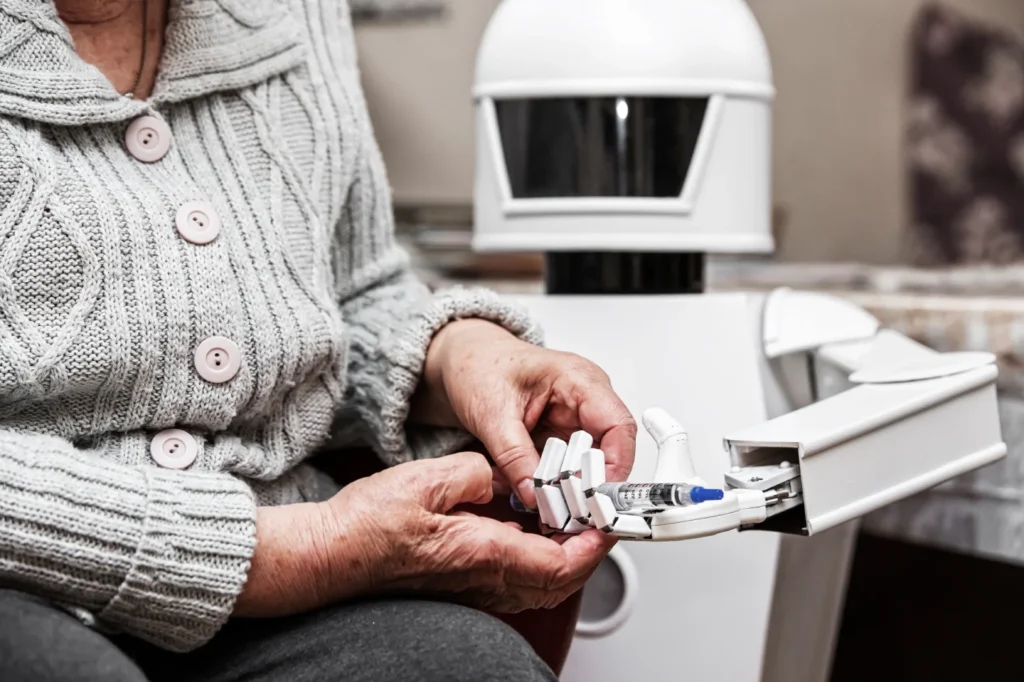
The future of face recognition in healthcare
The implementation of face recognition technology in the healthcare field has changed numerous operations for the better. From improved security and patient identification to better patient monitoring and diagnosis, it has helped improve patient experience and reduce the workload for healthcare workers.
In the future, face recognition will be even more ubiquitous than it is today. Advanced health monitoring and caretaking robots are just some of the applications that are being developed as we speak. The potential of face recognition in healthcare is vast, and we have yet to see the best of it.
How to get started with face recognition?
Implementing face recognition into your products, services, and processes should start with choosing the right software for your use case.
To create the best solution long-term, look for technology that is:
- Fast and lightweight, so that it can run smoothly on your devices, without compromising speed and accuracy.;
- Able to process a variety of file formats, including images, videos, or real-time feed;
- Privacy-first, making sure that not only your patients and staff feel safe but also that you’re compliant with privacy regulations;
- Available for your target platform(s);
- Easy to use and integrate into your existing systems and workflows.
At Visage Technologies, we’ve spent two decades perfecting powerful face recognition software that meets all these criteria and more.
Our in-house Research and Development Lab is fully committed to creating cutting-edge software that helps you build efficient, intuitive, and reliable solutions.
FaceRecognition – our robust face recognition software – provides fast and accurate results for identification and verification. That is why more than 300 clients worldwide choose us as their trusted technology provider.
ⓘ Our FaceRecognition is built to meet the highest standards of our clients. This has been proven via independent, world-renowned evaluations carried out by NIST (The National Institute of Standards and Technology), where our technology was the lightest and fastest.
Want to explore what top-notch face recognition can do for your business? Get started today by requesting your free evaluation license.
Try out powerful face recognition today
Get in touch to start your free trial and explore what FaceRecognition can do for your business.
